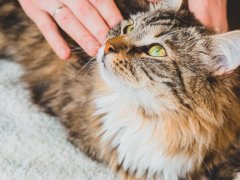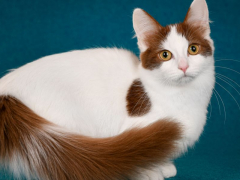
Most humans are familiar with the sensation of nausea on different occasions, ranging from seasickness, to viral infections, to hangovers. Cats can also suffer from nausea, and the aim of this article is to explain to cat carers why cats may develop this, how to identify it, and what to do to help cats suffering from nausea.
What Does It Mean When A Cat Suffers From Nausea
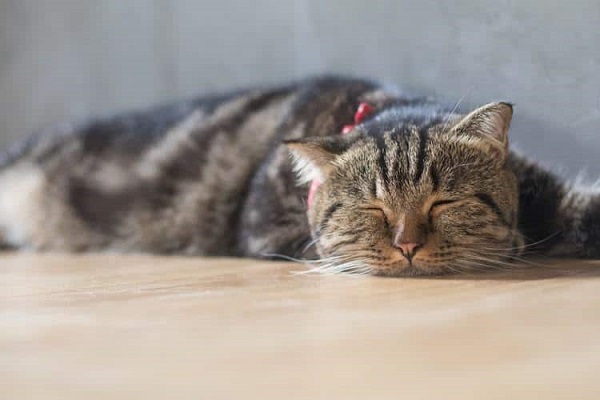
Nausea is defined as “a feeling of sickness with an inclination to vomit”. The challenge for cat owners is that cats can’t talk, so they cannot tell us when they have nausea.
However, by observing cats carefully, we can learn how they behave when they are shortly going to vomit, and we can then guess that when they should this same type of behavior at other times, it may be that they are feeling nauseous.
We also know that there are certain situations (such as cats on chemotherapy, or cats travelling in cars) when they may be more likely to suffer from nausea.
How Common Is Nausea In Cats?

Nausea is probably underdiagnosed in cats because they cannot explain to us that they are feeling nauseous. It’s probably a common feeling for sick cats to suffer from, and we should all be aware of the signs so that we can help them.
What Causes Nausea In Cats?
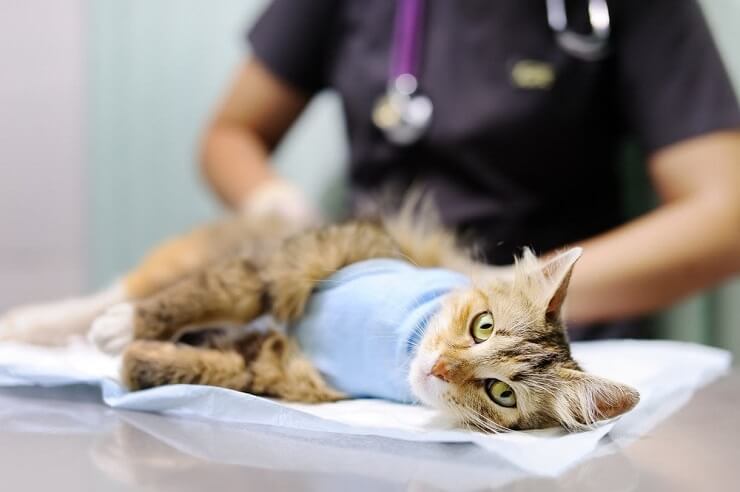
Nausea is likely in any condition or situation where underlying health problems cause regurgitation or vomiting in cats. Regurgitation means the bringing up of undigested food, while vomiting means that the cat brings up digested or semi-digested food.
Before a cat vomits or regurgitates, it is very likely that they suffer from a sense of nausea (i.e. the feeling that they are going to vomit).
The main common causes of regurgitation and vomiting in cats are listed below.
- Gastrointestinal tract disease, from inflammatory bowel disease (IBD, e.g. caused by food allergies), to hairballs, constipation, stomach ulcers, viral infections, to eating irritant substances, to gastric or intestinal foreign bodies causing a blockage, to parasites (including giardia), to neoplasia (cancer)
- Abdominal disorders, including pancreatitis (inflammation of the pancreas), liver disease, kidney disease, womb infection (pyometra), and peritonitis.
- Metabolic disorders including diabetes mellitus, hyperthyroidism, and others
- Toxic reactions, to ingested substances and also to prescribed drugs
- Motion sickness
- Central nervous disease such as vestibular disease, brain tumors
In all of the above situations, cats are likely to suffer from nausea before they physically vomit.
Symptoms Of Nausea
The clinical signs of nausea are probably easiest to interpret with hindsight: in other words, after a cat has vomited, it’s fair to say that their behavior up to the actual vomiting was probably linked to the feeling of nausea.
With this in mind, cats that are suffering from nausea show the following signs:
- Loss of appetite
- Salivation or drooling
- Dullness, staying hunched up in one place
- Lack of interest in surroundings, not playing or engaging with carer
- Vocalising in a distinct way (e.g. yowling)
- Retching
Investigating Nausea

There can be many possible causes of nausea and vomiting, which can include feeding a new food or supplements, ingestion of a foreign object etc
Mild cases of nausea or vomiting (e.g. a single episode) may just need a simple approach, such as a short fast followed by bland, highly digestible pet food for 48 hours.
However, as part of responsible pet care, if your cat develops repeated bouts of vomiting, you need to take them to your DVM veterinarian without delay, so that the underlying problem can be identified and so that treatment can be given. Your veterinarian may take the following steps.
1. Detailed History Taking
Your vet will discuss every aspect of your cat’s condition and review their overall cat health. There are a number of different possible causes of nausea and chronic vomiting, and this careful history gathering will help to pinpoint the cause.
Many factors are important in this history e.g. senior cats are more prone to certain problems than younger cats, cats that are free-ranging are more prone to some problems than indoor-only cats, etc. A dietary history is important: what sort of cat food does your cat eat?
Has a new food been started recently? Are they being fed any supplements? Are there any other factors that could be affecting their digestive system? Does the cat play with toys? Could ingestion of a foreign object be playing a role in nausea? Is the cat urinating normally? (cat owners should carefully observe their pet’s behavior in the litter box).
2. Physical Examination
Your veterinarian will check your cat’s body carefully all over, feeling the cat all over, checking for any abnormalities. This will normally include taking the cat’s temperature, listening to their chest with a stethoscope and weighing the cat (weight loss is associated with some causes of nausea).
3. Routine Blood And Urine Tests
It’s very likely that your veterinarian may carry out blood work, including the usual panel of diagnostic tests, such as hematology (blood count) and biochemistry profiles (including electrolytes). Simple urine tests may also be carried out. This type of work up is known as the minimum database, and it’s carried out to review most sick cats, regardless of the signs of illness.
4. Specialised Blood Tests
Your veterinarian may recommend specific blood tests, such as total T4 (to rule out hyperthyroidism), as well as tests for some viral infections such as FeLV and FIV, since there are significant implications if your cat is positive for either of these.
5. Other Tests:
Radiography (x-rays) and ultrasound examinations may be taken to examine the details of the digestive tract and abdomen. Depending on the case, more detailed diagnostic imaging (such as CT or MRI scan) may rarely be recommended.
Endoscopy and even biopsy of the gastrointestinal tract (perhaps including the esophagus, the cat’s stomach and the intestinal tract) may be recommended.
Blood pressure measurement may be carried in some cases as part of an overall cat health check.
How Much Does It Cost To Treat A Cat With Nausea?
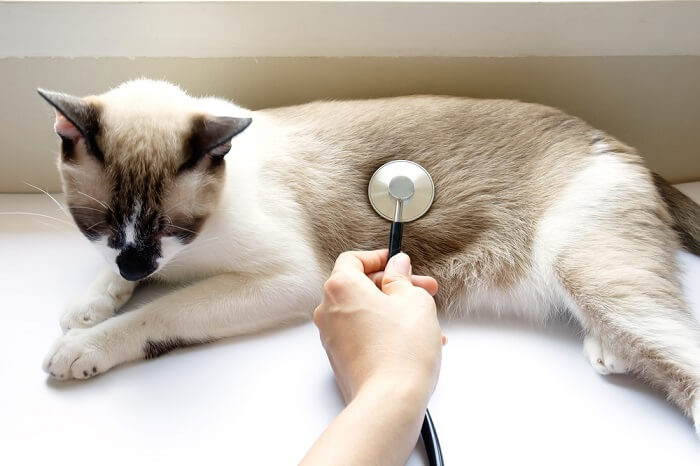
The primary aim is to treat the cause of nausea and once the underlying illness has resolved, nausea will also resolve Also, specific anti-nausea treatment may be given to relieve the signs of nausea.
The cost depends entirely on the cause of nausea, and it may be less than $100 if a cat has a simple type of nausea linked to a one-off upset stomach, to over $4000 if a cat has nausea caused by a complex problem such as cancer.
Can Nausea Be Treated?
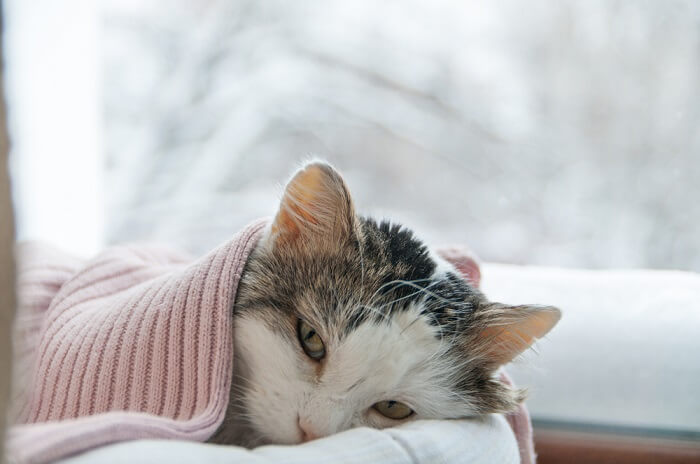
Treatment for nausea is variable, depending on the cause.
The primary aim is usually to treat the cause of nausea: once the underlying illness has resolved, nausea will also resolve. For example a cat with liver disease or hyperthyroidism will stop feeling nauseous once the liver disease has resolved, or once the hyperthyroidism is controlled.
Specific anti-nausea treatment may be given to relieve the signs of nausea while the underlying cause is being treated. This may also be needed for other situations where the underlying cause is unavoidable e.g. motion sickness, or nausea linked to chemotherapy.
What Specific Anti-Nausea Treatment Is Available?
Sometimes, a simple approach such as feeding a low-fat, easily digestible bland diet may help in a non-specific way.
Generally, anti-vomiting medication (known as “anti-emetic”) is used to treat nausea. Anti-nausea treatment is a prescription-only medication, so this is a topic to discuss with your veterinarian.
The main products that veterinarians may suggest include:
- Maropitant (“Cerenia”) which may be given by injection or orally
- Ondansetron and dolasetron are from a group of drugs called 5HT3 blockers which may be used by veterinarians on some occasions but this may be “off label” use in some jurisdictions.
- Metocopramide (Maxolon) is commonly used in dogs as an anti-nausea drug, but due to possible neurological side effects at high doses in some cats, it’s used less often than maropitant
- Granisetron and dexamethasone may be used to ease the specific type of nausea that may be seen with some types of chemotherapy: again, this may be “off-label” use.
- Some other products that may be used in order to reduce nausea in specific situations include anti-acid medications, and products that assist with gastric mucosal protection (e.g., sucralfate).
Monitoring And Prognosis

The degree of monitoring needed depends on the individual case, but in general, cats with nausea need frequent rechecks by their DVM veterinarian until they have returned to normal.
The prognosis depends entirely on the individual case and the underlying cause of nausea. Your own veterinarian will be able to give you the best answer to this question.
Conclusion
Nausea is usually a prelude to vomiting, which has many possible causes in cats, and should be investigated and treated by a DVM veterinarian. The nausea will resolve once the vomiting has been successfully treated, but in the interim, your veterinarian may give your cat medication to ease the nausea that is making them feel unwell.


